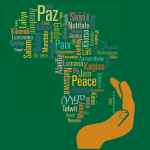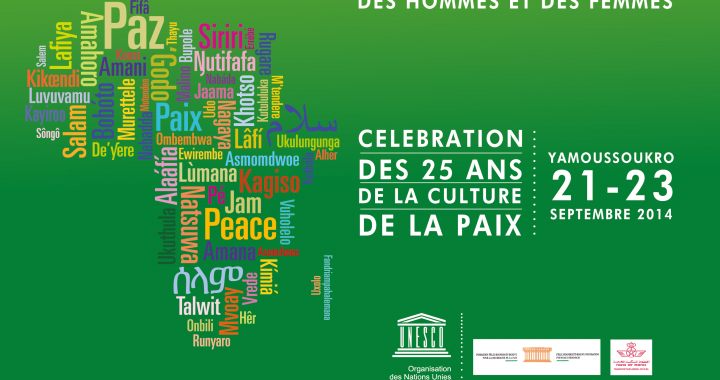It was at the International Congress of UNESCO in 1989 in Yamoussoukro on the theme “Peace in the minds of men” that UNESCO adopted this vision where “Peace is more than the end of conflicts armed” and where “Peace is Behavior”.
To commemorate this new idea twenty-five years ago – but also to demonstrate its increased relevance for our time – UNESCO and the Félix Houphouët-Boigny Foundation for the Search for Peace have once again joined forces the high patronage of the President of the Republic of Côte d’Ivoire, organizing a meeting in Yamoussoukro from September 21 to 23, 2014 entitled “Peace in the minds of men and women“.
This event had the double ambition of measuring the path taken since 1989 and exploring future avenues, notably by launching the activities of the Network of Foundations and Research Institutions for the Promotion of a Culture of Peace in Africa, created in September 2013 in Addis Ababa.
In an effort to face up to an international agenda marked by intolerance and, in particular, religious extremism, the organizers set out to mark the beginning of the meeting with an Ecumenical Peace Ceremony. This was held on September 21, the date of the International Day of Peace, and brought together in the Basilica of Our Lady of Peace such personalities as the rector of the Basilica, the Imam of the Great Mosque of Yamoussoukro , a Methodist minister and representatives of other religious communities.
On Monday, September 22, the opening ceremony gave a tribute to Minister Joachim Bony, Former Secretary-General of the Houphouët-Boigny Foundation for Peace Research, as well as speeches by Mrs. Albert Tévoédjrè, Ombudsman of the Republic of Benin, Jean Kouakou Gnrangbe, Mayor of the Yamoussoukro Commune and Jean Noël Loucou, Deputy Secretary-General of the Houphouët-Boigny Foundation for the Search for Peace.
The meeting opened with a video message from the Director-General of UNESCO, Mrs. Irina Bokova, who welcomed the commitment of the Côte d’Ivoire authorities in favor of peace. “should guide us in our understanding of situations of crises, many, and violence of the world”. She added that “We must respond boldly, with a vision of peace in the broad sense that goes well beyond the end of fighting, and touches the heart of the human.”
The Assistant Director-General of UNESCO for Africa, Mrs. Lalla Aïcha Ben Barka, concluded her speech by saying “I am confident that the culture of peace will continue to gather ever more energies, a future of Africa under the banner of sustainable peace and development. ”
The floor was then addressed to HE Mr. Mohamed Sameh Amr, Chairman of the Executive Board and Permanent Delegate of Egypt to UNESCO. He recalled the major steps leading up to the proclamation in 1989 of the concept of a culture of peace by the Member States of UNESCO and its full adoption by the United Nations, a high point of which was undoubtedly the Decade for a Culture of Peace and Non-Violence for the Children of the World (2001 – 2010). This decade, under the auspices of UNESCO, is now being promoted in the Decade for the Rapprochement of Cultures (2013-2022), which focuses on intercultural and inter-religious dialogue.
Different international and regional organizations were represented: the African Union, the African Development Bank, the Economic and Monetary Union of West African States and the Mano River Union. Ms Hiroute Guebre Sellassie – Special Envoy of the UN Secretary-General for the Sahel, stressed the importance of “further developing strategic partnerships among UN agencies to ensure synergy in actions and effectiveness in the As part of my mission, I am committed to working in this direction with UNESCO and other partners to anchor the culture of peace, a major tool for sustainable development and stability. ”
In a video message the former Director-General of UNESCO, Mr Federico Mayor welcomed the fact that, thanks to all these efforts led by UNESCO and its partners, and hoped that an example would be taken of Latin America, notably Bolivia and Ecuador, which had included the culture of peace in their constitution.
The celebration ended with an address by His Excellency Mr. Daniel Kablan Duncan, Prime Minister of the Government of Côte d’Ivoire, focusing on his country’s emphasis on the culture of peace as a bridge to national reconciliation after a period of post-electoral disturbances which had plunged Côte d’Ivoire into chaos.
In the afternoon, round tables were held to give the floor to some of the great witnesses of the culture of peace, some of whom were present at the creation of the concept years ago.
Then the participants adopted the declaration “Yamoussoukro + 25”, in which they reaffirm the need to promote a culture of peace in all regions of the world. They pledged to participate in the implementation of the “International Decade for the Rapprochement of Cultures” and the “Plan of Action for a Culture of Peace in Africa” adopted in Luanda (Angola) in 2013. participants wished to support the creation of a “Biennale of Culture of Peace in Africa”, as proposed by the Government of Angola at UNESCO. This recurrent event will make it possible to make a progressive assessment of the implementation of this program on a continental scale.
The day ended with the award ceremony organized by the Center for Studies and Strategic Prospects (CEPS), in partnership with the Center for Studies and Strategic Prospects (“CEPS”), the “Stepping Stone for Youth Social Entrepreneurship and the Culture of Peace” UNESCO. This $ 10,000 prize was awarded to a young Ivorian entrepreneur for the creation of an online training tool in the presence of the Minister of Culture and the Francophonie representing the Prime Minister of the Republic of Côte d’Ivoire ‘Ivory.
The following days were devoted to the work of the Network of Foundations and Research Institutions for the Promotion of a Culture of Peace in Africa, created in 2013 at the headquarters of the African Union in Addis Ababa, Ethiopia. The 39 members of the network present defined their plan of action for the next two years and the modalities of their cooperation.
The Yamoussoukro meetings ended on September 24 with the preparatory meeting of the 1st Biennial of the Culture of Peace in Africa, to be held in Luanda (Angola) in 2015.

